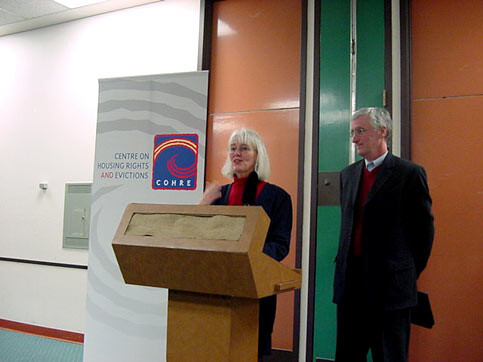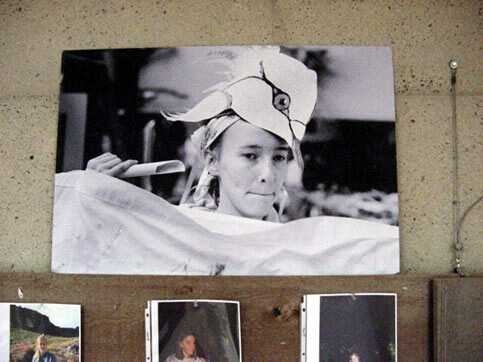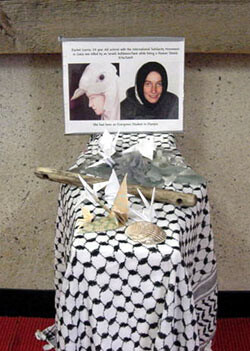The Electronic Intifada 11 March 2004
PARENTS ACCEPT POSTHUMOUS HONOR FROM CENTRE ON HOUSING RIGHTS AND EVICTIONS

Cindy and Craig Corrie speaking at the COHRE awards ceremony on February 16, 2003 at The Evergreen State College in Olympia, Washington.
“Unwavering bravery and courage”
“With her unwavering bravery and courage, Rachel Corrie’s determination to stand up for justice in the face of ruthless violence, serves as an inspiration for the defense of human rights and the struggle to implement those rights without compomise.” — COHRE Press Release.
In a moving ceremony on 16 February 2004, Craig and Cindy Corrie accepted the Housing Rights Defender Award from the Centre on Housing Rights and Evictions (COHRE) on behalf of their daughter Rachel Corrie. This was the inaugural year for this award, which was partially a response to the heroism of Ms. Corrie’s actions in protecting the housing and water rights of Palestinians in occupied Gaza. Ms. Corrie died March 16th, 2003 in Rafah while attempting to prevent the forced eviction of a Palestinian family and the demolition of their home.
“In part, Rachel’s activism and death inspired us to create this award which will now be given annually,” said Bret Thiele, a Coordinator in the Litigation Programme who traveled to Olympia for the ceremony. “COHRE has monitored and denounced the human rights violations of the government of Israel for years, and we know all too well the gravity of the situation with respect to housing rights. We therefore wanted to recognize Rachel’s advocacy, and indirectly the advocacy of organizations doing the same work as Rachel such as the International Solidarity Movement (ISM) and Rabbis for Human Rights, and to bring attention to the daily human rights violations occurring in the Occupied Palestinian Territories (OPT).”
COHRE’s work for human rights
COHRE is a not-for-profit foundation based in Geneva but has offices worldwide and does frequent work with the United Nations. The organization states, “In its ten years of work COHRE has assisted in halting numerous large-scale forced evictions, which if carried out, would have added several million people to the world’s homeless population. COHRE has fundamentally reshaped international law standards on housing rights and eviction issues, through obtaining the adoption of over 50 new international standards on these issues.”
For the past two years COHRE has presented Housing Rights Violator/Protector Awards to deserving governments, corporations and agencies across the world. Past recipients of the Violator Awards include the United States, Israel, Croatia, India, Pakistan and Nigeria, all countries that have “distinguished themselves in showing extraordinary disdain for human rights.”
Winners of the Protector Awards in 2002 were the governments of Brazil, East Timor and South Africa. According to COHRE, “All three have proven that, despite severe economic and political difficulties, housing rights can still be prioritised, protected and even promoted. Emerging from violent and repressive histories, all have taken notable steps in redressing the human rights abuses of the past.”
Awards are generally presented in Geneva, Switzerland in a November ceremony but scheduling conflicts did not allow the Corries to travel to Europe at that time. Mr. Theile explains “We decided to come to Olympia to present the award, in part for the convenience of the Corries and in part to include Rachel’s larger community.”

Rachel Corrie in 2002, working on her peace dove costume. This photo was taken at the Rachel Corrie Memorial at The Evergreen State College in Olympia, Washington.
“Heart and soul of the Olympia Movement for Justice and Peace”
This is a point driven home by Cindy Corrie, when accepting the award she stated that she felt she was accepting it not only for Rachel but for all of her friends and those in her community that have come together to further Rachel’s work. She also praised Rachel’s friends and community for helping “to make her who she is.” Near tears she expressed gratitude to all of the organizations like COHRE saying that it was “helpful and moving to hear of the award.”
Ms. Corrie’s involvement in her community was spoken of with deep affection by Peter Bohmer who met Rachel in 1989. He talked of her passion for activism, describing Rachel as the “heart and soul of the Olympia Movement for Justice and Peace.” Larry Mosqueda, who along with Mr. Bohmer, is a professor at The Evergreen State College (TESC) earlier had told the audience about how Rachel would complain of being too tired to attend yet another OMJP meeting but would go anyway “so that Larry would not be the only one at the meeting.”
Carrying on the work of Rachel Corrie

A part of the Rachel Corrie Memorial at The Evergreen State College in Olympia, Washington, the origami doves all have messages for Rachel written on them.
This was one of the reasons that Rachel went to Rafah, she wanted to connect Olympia and Rafah in a tangible and personal manner. She wanted Olympia to know what was going on in Rafah and that there were ways we could reach out to one another. Her trip was not all about standing in front of bulldozers.
Also speaking at the ceremony was Christi McGinley, a member of the Olympia Rafah Sister City Project (ORSCP), an organization envisioned by Ms. Corrie and brought to fruition in her name by a group of dedicated Olympians. A recent December benefit enabled the group to make a $4000 grant to Rafah for medical supplies.
The group is also helping to facilitate and support delegations to Rafah to witness the situation, make face-to-face alliances on the ground and report back in the United States. Outreach and education is a key mission of the ORSCP.
Corries visit the house Rachel died protecting
Craig Corrie detailed three of the families and homes that they had visited while in Rafah last fall on a journey to view for themselves Rachel’s experiences. All three of the families had formed connection with Rachel, given her shelter and food and the Corries had been interested in spending time with these friends of their daughter’s.
One of those homes was that of Samir Naserallah, a Rafah pharmacist, whose home Rachel was bulldozed in front of. Craig Corrie told of a request by the United States Embassy for the Corries to coordinate their visit with the Israeli Defense Forces (IDF) to help ensure their personal safety. The Corries were instructed to call the IDF twenty minutes before their trip, give a description of their vehicle, its plate number and the number in his group. Mr. Corrie said there was some frustration over this aspect due to the fact that they would be taking a taxi and did not know the specifics of the vehicle.
Despite this advance preparation, as the Corries sat down to tea with their hosts, there was the sound of a bulldozer approaching the house. As they looked outside through a crack in the wall, the same crack Mr. Naserrallah had witnessed Rachel’s death through, they saw an APC 30 meters away. Unable to reach the US consulate by phone, Mr. Corrie called the IDF to complain. The vehicles then retreated but 2 APCs and 2 bulldozers remained “mucking around” in the distance for the balance of their visit.
Craig Corrie fired on during Rafah visit
As they visited the family of Abu Jameel, night came and Craig talked about the danger as they left the home. The Corries kept close to the walls as they walked scared from the watchtower at the end of the street. Their host, despite the peril, walked down the center of the street.
The third family Mr. Corrie told about lived on the south edge of Rafah and their house looked out on the wall separating Egyptian Rafah from Gaza Rafah. One of the girls in the family showed the Corries a letter Rachel had written her encouraging her to continue her studies. The letter was precious to the girl who was trying to do her best despite the war around her.
The next day their house was raided by the IDF in their search for border tunnels. The IDF used dogs and held the family at gunpoint for five hours, all the time pressuring them for the location of tunnels. The day after the Corries returned and saw some of the damage done by the soldiers. Mr. Corrie, who “was a combat engineer with the US Army in Vietnam,” saw “the trench made with a backhoe between the house and the border. Earth was against the house and bashed in the dining room wall to look for the tunnels.” As he inspected the area, warning shots came whizzing by, close enough to force Corrie to leave.
“Wrenching” to hear the news from Rafah
Earlier, when introducing the Corries, Mayra Gomez from COHRE gave the statistic that 584 homes had been destroyed in Rafah alone since the January 16th IDF incursion. This figure includes the homes of two of the families that Craig and Cindy had met with in Gaza. Dr. Samir’s house was torn down shortly before the incursion, on January 10th.
ISM activists in Rafah report that Abu Jameel lost his house on 4 a.m. on January 20th. The family was given five minutes to evacuate and then the house was blown up with dynamite. Although at least 20 were reported injured, Abu Jameel and his family was said to be safe at the time. The next day between 5 and 6 a.m. the IDF returned with the bulldozers to level the rubble. According to ISM Rafah, 7 more people were injured. They also report “31 year old Mona Ismail was shot in the head and killed as she attempted to see what was happening. Her sister, Manal Ismail, 29, was also shot as she went to assist Mona. She is in critical condition after sustaining gunshots to the chest and back.”
Craig Corrie said it was “wrenching” to hear of the news of these demolitions, “to feel it, (to) not just intellectualize things.” In an email to the ORSCP, sharing the news of the demolition of Dr. Samir home, Cindy Corrie describes the news as “devastating” and writes “Strangely, not so much because it was the house Rachel was protecting but because I have this experience of having spent time in the house - and now it’s demolished. I cannot imagine how it feels to the family who built the house, lived there, and tried to resist by staying so long. I just don’t understand the inhumanity of it all.”
Originally from New York, candio. now lives in the Pacific Northwest. She is an artist, writer and activist. Her work has been shown in galleries and museums, in private collections internationally and on the street. She has a history of writing for alternative presses and arts publications and currently publishes online. She is also researching a book on trauma and it’s physical and psychosocial effects.
Related Links





